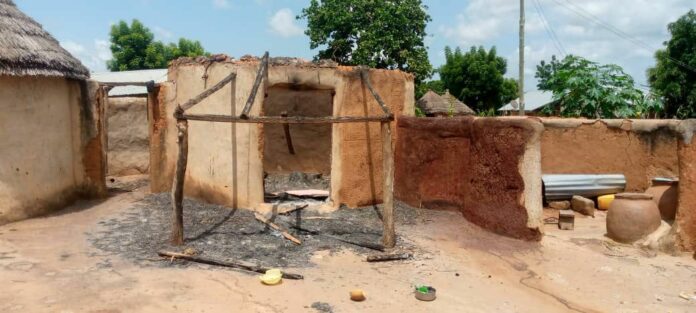What started as a disagreement between Bimbagu, the majority, and Naniik, the minority, over the elevation of sub-chief Naniik Daana to paramountcy status in the Bunkpurugu-Nakpanduri District of the North East Region has escalated into violence, leaving hundreds displaced.
About a month ago, the youth of Bimbagu petitioned the National House of Chiefs not to confirm the nomination and gazette of Naniik Daana for elevation as a paramount chief. They expressed their dissatisfaction with how the Mamprugu Traditional Council and the North East Regional House of Chiefs were handling the matter.

According to the youth, the Naniik chief is under the Bimbagu chief, hence the Naniik chief cannot be promoted to paramountcy while the Bimbagu chief remains demoted. In this regard, they called on the National House of Chiefs to halt the processes of elevating Naniik Daana to paramountcy status, stressing that any attempt to undermine their plea has the potential to ignite armed violence between the two communities, and the National House of Chiefs should be blamed for their negligence.

In response to their press briefing, the District Chief Executive for Bunkpurgu-Nakpanduri and chairman of the District Security Committee assured that DISEC is on top of security in the area, revealing that the two groups would be engaged on the need to coexist peacefully.

However, things did not go as expected, as it became obvious that Naniik Daana had been confirmed to the status of paramountcy by the National House of Chiefs. This arose anger on the side of the Bimbagu community, which resulted in deadly gunshots fired by two unidentified men on a motorcycle in the Naniik community, killing one on the spot and injuring another who is currently battling for his life at the hospital.

According to eyewitness accounts, the Naniik community was at the cemetery with some policemen to bury the deceased when gunmen appeared and started shooting. Both police personnel at the cemetery and community members had to run for their lives since the police were unarmed, thus had to call for reinforcements.

The once lively streets of Naniik, the minority group, are now silent and empty, with many families left without homes. As of Monday, the Naniik community stands deserted. During my visit, I encountered only three women with babies and an elderly man who voiced his helplessness.

He said, “I came to settle here; I’m not interested in any chieftaincy issues, and I have nowhere to go, so I’m waiting for them to do whatever they feel like doing.” This sentiment reflects the despair felt by many in the area. In response to the violence, police have stepped in to establish order. They have set up a strong security presence and imposed a 24-hour curfew in Bimbagu to prevent further clashes however , no arrest has been made so far.

Despite these efforts, the atmosphere remains tense, and many people are anxious about what might happen next. Schools and health centers in both Bimbagu and Naniik have been closed, disrupting essential services for residents and leaving families without access to education and healthcare.

Reports indicate a troubling selectivity in the actions of the perpetrators, raising concerns about targeted violence. Several farm products, especially groundnuts, have been destroyed, further straining the livelihoods of families in these farming communities. Both Bimbagu and Naniik depend heavily on agriculture, making the loss of crops particularly devastating.

Neighboring communities are now on high alert, fearing that the conflict may spill over into their areas. Residents express anxiety over the irregular shootings, worried that innocent travelers could become unintended victims of the ongoing violence.

The unsettling silence that now envelops the streets serves as a haunting reminder of the community’s loss and turmoil.

Authorities are urgently calling for calm among residents and emphasizing the importance of peaceful talks to resolve the ongoing issues. Community leaders are rallying for unity, hoping to bring the two sides together to prevent more harm. They understand that the path to healing will be difficult, but they remain hopeful for a peaceful resolution.
By Solomon Kwame Kanaluwe North East Region correspondent













